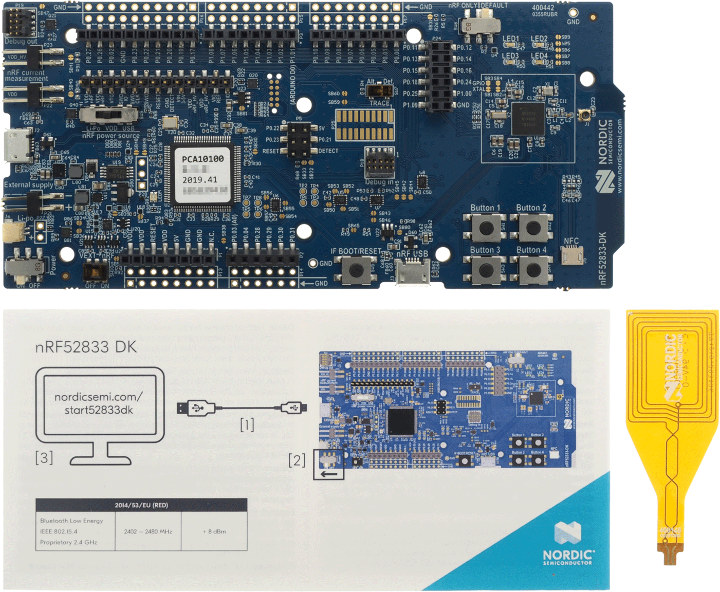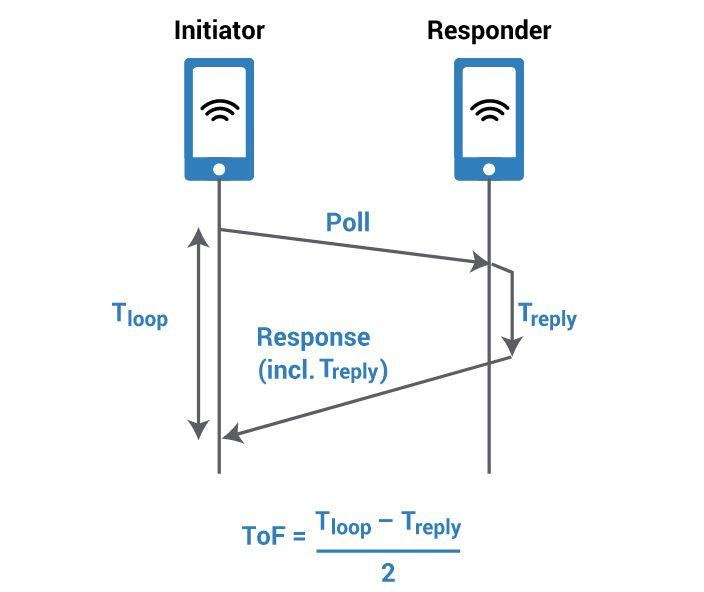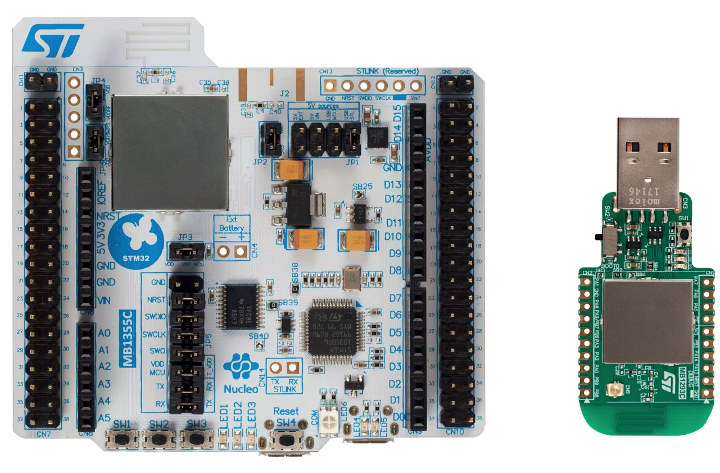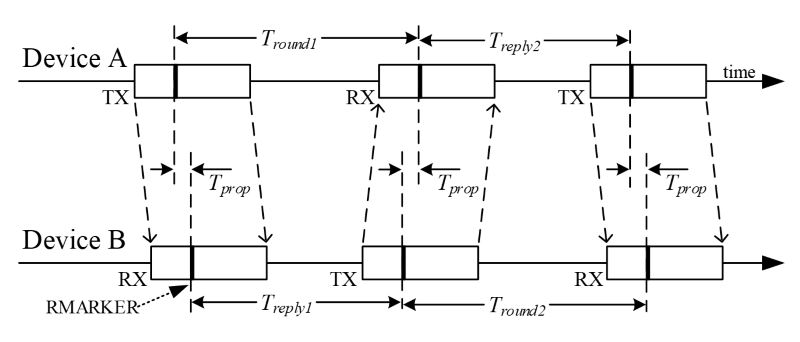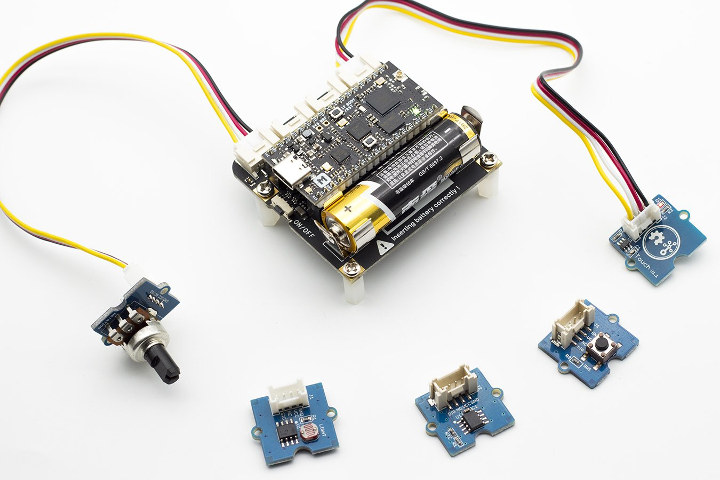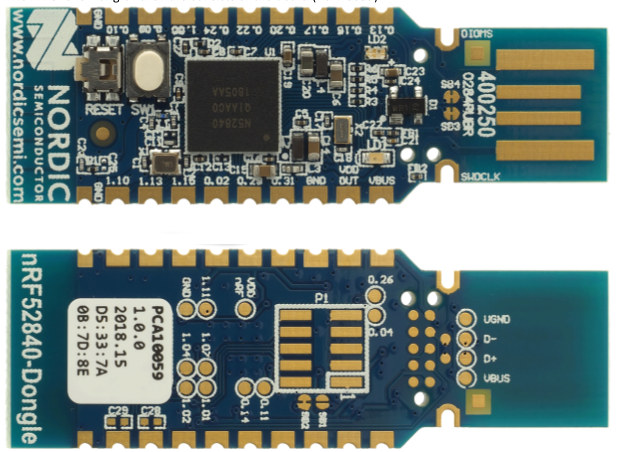Energy harvesting has been an exciting area people have tried to venture into mostly because of the possible applications that can arise from it. Newly invented energy-harvesting technologies accompanying low-power computing systems have pushed the boundaries of where embedded systems can be deployed. The demand for an increase in connected applications which require an underlying embedded system, and as we know, all electronic devices require a power source of some sort. This power source, batteries in most cases, comes with an accompanying buck regulator of some sort that will tend to increase the BOM. Aside from the BOM rise from the usage of batteries, there is also the shelf life and environmental aspects. The Norwegian specialist ONiO has introduced the ONiO.zero to address those issues. Having no battery means fewer components and a smaller design, which can easily be integrated into a wide range of solutions – be it fabrics, […]
Nordic Semi nRF52833 WiSoC Supports Bluetooth 5.1 Direction Finding, Works up to 105ºC
Nordic Semiconductors had added a new member to their RF52 multi-protocol wireless SoCs with nRF52833 that supports Bluetooth 5.1 direction finding and can operate in a wider temperature range between -40ºC and +105°C. The company also introduced nRF52833 DK development kit for Bluetooth Low Energy, Bluetooth mesh, Thread, Zigbee (802.15.4), and 2.4GHz proprietary applications, and some companies have already announced nRF52833 modules. Nordic Semi nRF52833 Bluetooth 5.1 SoC Key features and specifications: MCU Core – Arm Cortex-M4F @ 64 MHz Memory – 128 KB RAM Storage – 512 KB Flash Connectivity Bluetooth 5.1 @ 2 Mbps/1 Mbps/500 kbps/125 kbps 802.15.4 (Thread/Zigbee) @ 250 kbps 2.4 GHz proprietary @ 2 Mbps / 1 Mbps NFC-A tag TX power – Programmable from +8 dBm to -20 dBm in 4 dB steps Sensitivity Bluetooth 5: -103 dBm at 125 kbps; -98 dB at 500 kbps; -95 dBm at 1 Mbps; -92 dBm at […]
Ellisys Bluetooth Vanguard is a Best-in-Class Bluetooth Protocol Analyzer
ARM TechCon is Arm’s premier industry event, where developers, analysts, and media gather from all around to hear the latest from the semiconductor giant. ARM TechCon 2019 has marked the 15th annual event hosted in San Jose. Arm TechCon 2019 showcased some of the industry’s best products and solutions in the market. Embedded Computing Design hosted a Best in Show Awards showing some of the most innovative solutions from the even. One of the notable award recipients is the Ellisys Bluetooth Vanguard Protocol Analysis System. Ellisys Bluetooth Vanguard Advanced All-in-One Bluetooth Analysis System is being regarded as the most advanced and comprehensive Bluetooth Protocol analyzer ever made mostly because it delivers new advances designed to ease the increasingly complex tasks of Bluetooth developers and many more. Building Bluetooth based applications can be a daunting challenge, especially when working with the wrong tools/equipment. Aside from Bluetooth wireless traffic debugging, other information […]
FiRa Consortium Ultra Wide-Band Ecosystem To Deliver Precise Indoor Positioning
The FiRa Consortium has just been established by the ASSA ABLOY Group which includes HID Global, and NXP Semiconductors, Samsung Electronics, and Bosch, and joined by Sony Imaging Products & Solutions Inc, LitePoint and the Telecommunications Technology Association (TTA) in order to grow the Ultra-Wideband (UWB) ecosystem providing accurate positioning for a variety of mobile and consumer applications. The FiRa stands for “Fine Ranging”, and UWB technology relies on the IEEE 802.15.4z standard that provides real-time centimeter accuracy indoor positioning. The consortium claims “UWB technology outperforms other technologies in terms of accuracy, power consumption, robustness in RF connection, and security, by a wide margin”, especially in challenging environments. The main roles of the FiRa Consortium will be to develop an interoperability standard, and promote the development of UWB applications. Some of the use cases include: Seamless Access Control – UWB can identify an individual’s approach toward or away from a […]
STMicro Launches STM32WB55 Bluetooth 5 and 802.15.4 MCU & Nucleo Pack
STMicro unveiled their first STM32 Wireless MCU family at Embedded World 2018 last year with STM32WB dual-core Cortex-M4/M0+ microcontroller equipped with Bluetooth 5 and 802.15.4 radios, but it was only this year at Embedded World 2019 that the company announced commercial availability of STM32WB55 family as well as the P-NUCLEO-WB55 development pack containing a classical Nucleo 64 board and a USB dongle. STMicro STM32WB55 Bluetooth 5 & 802.15.4 MCU Key features and specifications: Application Core – Arm Cortex-M4 CPU @ up to 64 MHz with FPU, adaptive real-time accelerator (ART Accelerator), MPU, 80 DMIPS and DSP instructions Memory – Up to 256 KB RAM, including 64 KB with hardware parity check, 20×32-bit Backup Register Storage Up to 1 MB Flash with sector protection (PCROP) against R/W operations for Bluetooth Low Energy and 802.15.4 SW stack Quad SPI memory interface with XIP Radio 2.4 GHz RF transceiver supporting Bluetooth 5 and […]
802.15.4z Standard to Provide Real-time Centimeter Accuracy Indoor Positioning
GNSS (Global Navigation Satellite System) solutions like GPS or Beidou offers outdoor positioning with an accuracy of about 2-in-3 meters in optimal conditions for consumer devices, and starting in 2022, the upcoming GPS III will bring that down to as low as 1 meter again in consumer devices. For that only works for outdoor positioning, and for indoor positioning we’ve already covered WiFi RTT, and Bluetooth proximity beacons. The latter has been around for a while, but does not really provide accurate indoor positioning since they’d usually report the distance with less than 10 meters accuracy, and the lag is fairly large with 3 to 6 seconds needed to estimate the distance. The recently released Bluetooth 5.1 specification addresses this issue by enabling location services accurate to within 10 centimeters thanks to a new direction-finding capability made possible with an antenna array. However, as pointed out by EETAsia, there’s another […]
nRF52840 MDK Base Dock Adds AA Battery Holder, Grove Connectors
Makerdiary nRF52840 Micro Development Kit (MDK) is a breadboard-friendly devkit for Nordic Semi nRF52840 multi-protocol wireless SoC that supports Bluetooth 5.0, Thread, IEEE 802.15.4, ANT, and 2.4GHz proprietary, and various popular frameworks or OS such as Arm Mbed OS, or the Zephyr Project. nRF52840 MDK Base Dock makes development just a little easier, by adding an AA battery holder, and four Grove connectors compatible with Seeed Studio’s Grove modules. nRF52840 MDK Base Dock specifications: Dual 2×18 Socket Headers compatible with nRF52832-MDK & nRF52840-MDK 4 Grove connectors with selectable UART/I2C/I2S/PDM/QDEC/SPI/ADC NFC tag-A PCB Antenna Power Power button with latching circuit AA battery holder Synchronous, Step-up Converter with VIN>VOUT Down Mode Operation 0.8V-to-4V Input Range 3.3V Output with Over-Current Protection Battery level sensing with 1:2 voltage divider on AIN2 Low power consumption: 5uA Shutdown Current; 145uA Idle Current Dimensions – 58mm x 54mm x 17mm The board also adds an NFC PCB […]
$10 Nordic Semi nRF52840 USB Dongle Supports Bluetooth 5, Thread, ZigBee, 802.15.4, ANT and 2.4GHz Proprietary
Several weeks ago, as I noticed the lack of Bluetooth 5 USB dongles, I found MakerSpot CC2640 Bluetooth 5 USB stick based on Texas Instrument CC2640R2F Arm Cortex-M3 WiSoC. It’s not exactly a consumer products, and instead it’s more like a development kit, but it can still be inserted into the USB port of your computer or development board. Today, I found out Nordic Semi also made their own Bluetooth 5 – or is it Bluetooth 5.0 now, I’m really confused at this point – USB dongle for evaluation & development based on nRF52840 WiSoC. It’s not only for Bluetooth 5 though, as the multi-protocol SoC also supports Bluetooth Low Energy, Bluetooth Mesh, Thread, Zigbee, 802.15.4, ANT(+), and 2.4 GHz proprietary solutions. nRF52840 USB dongle (PCA10059) key features: Wireless Connectivity – Bluetooth 5, Bluetooth Low Energy, Thread, Zigbee, 802.15.4, ANT/ANT+, and 2.4GHz USB – USB 2.0 ports Expansion – 15x […]



